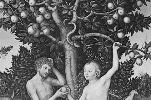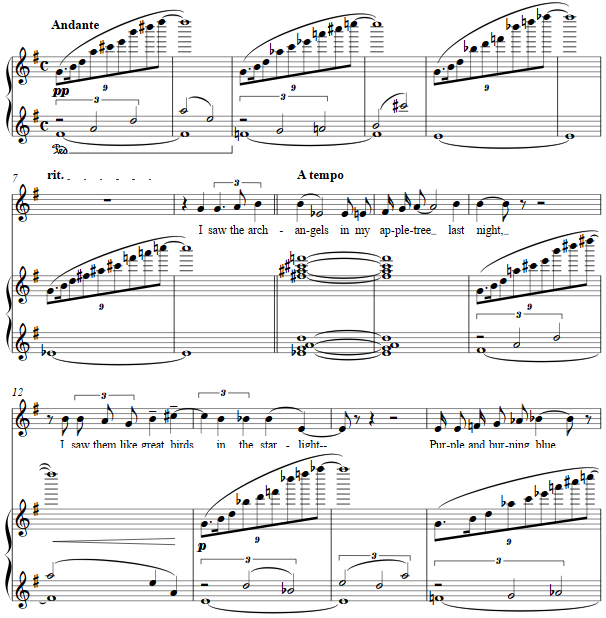Music and Texts of GARY BACHLUND
Vocal Music | Piano | Organ | Chamber Music | Orchestral | Articles and Commentary | Poems and Stories | Miscellany | FAQs
The Apple-Tree - (2018)
Nancy Campbell
for mezzo soprano and piano
for Jacquelyn Matava
I saw the archangels in my apple-tree last night,
I saw them like great birds in the starlight—
Purple and burning blue, crimson and shining white.
And each to each they tossed an apple to and fro,
And once I heard their laughter gay and low;
And yet I felt no wonder that it should be so.
But when the apple came one time to Michael’s lap
I heard him say: "The mysteries that enwrap
The earth and fill the heavens can be read here, mayhap."
Then Gabriel spoke: "I praise the deed, the hidden thing."
"The beauty of the blossom of the spring
I praise," cried Raphael. Uriel: "The wise leaves I sing."
And Michael: "I will praise the fruit, perfected, round,
Full of the love of God, herein being bound
His mercies gathered from the sun and rain and ground."
So sang they till a small wind through the branches stirred,
And spoke of coming dawn; and at its word
Each fled away to heaven, winged like a bird.4 pages, circa 3' 30"
Detail from Adam and Eve by Lucas Cranach the Elder (1472–1553)
Nancy Campbell (née Nancy Maude, 1886-n. d.) was married in 1910 to Irish poet Joseph Campbell, and then permanently separated in 1924. Born in England, she visited Ireland in 1907 and again in 1909, meeting poet and writer Campbell, thereby becoming estranged from her family. She published collections of poetry, The Little People (1910) and Agnus Dei (1912), and had two poems published in poet and editor Harriet Monroe's magazine Poetry in 1915. This is one of those two poems.
The apple tree is part of a central myth of the Judeo-Christian world, as well as varying notions of angels. Dreams figure in other biblical myths as well as in the recent growth of the discipline of psychology in which mythic elements played out in dreams are interpreted with various import and meaning. The apple from that mythic apple tree, as forbidden fruit, was the totem by which knowledge of "good and evil" was said to have entered the mind of man. Thus, this poem's "praise" places in the words of an angel might link "mercies" with that "knowledge of good and evil" which remains a central religious and philosophical struggle over millennia.
That Campbell mentions four angels' names is interesting. The "El" being an abbreviation of a longer term for God, the prefixes add some modifier. Gabri-el as God as strong or heroic, Rapha-el as God as healer, Micha-el as the question "who is like God," and Uri-el as God as light. That aspects of God formed as characters in conversation is the specific standing against the general theme, as the apple from that apple tree is both ordinary and ripe with mythic meaning as well, "gathered from the sun and rain and ground." One may also notice that they "spoke" and yet the poem ends declaring "so they sang." A fine metaphor to also explain texts' relationship to song settings.
The opening gestures overlay harmonic domains unrelated to the overtone series as the musical imaging of a dreamlike state is imagined. What begins rooted on the F sharp in the left hand ends the song setting, as various tonal domains move from center to nest temporary center, as the voice line declaims the lines of the text rather in the fashion of an accompanied recitative.
The score is available as a free PDF download, though any major commercial performance or recording of the work is prohibited without prior arrangement with the composer. Click on the graphic below for this art song score.

